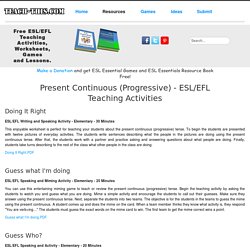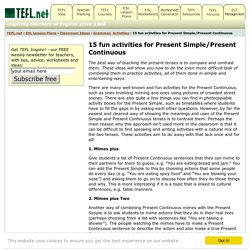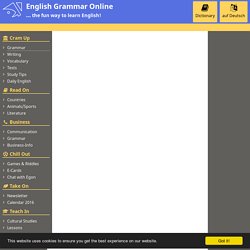

Future tenses - will, going to, doing game. Future tenses - will, going to, doing: Practice future tenses - will, going to, doing using this ESL fun Game.This game is also excellent for classroom teaching.

Teachers can engage students in a classroom vocabulary or grammar review. It is suitable for intermediate and advanced esl learners. It can be used to energize a dull class, to review work that was done or simply as a reward for good classroom work. Have fun teaching and learning English! Games are great for motivating students to learn. More Games. Present Continuous - Progressive. Doing It Right ESL/EFL Writing and Speaking Activity - Elementary - 30 Minutes This enjoyable worksheet is perfect for teaching your students about the present continuous (progressive) tense.

To begin the students are presented with twelve pictures of everyday activities. The students write sentences describing what the people in the pictures are doing using the present continuous tense. After that, the students work with a partner and practice asking and answering questions about what people are doing. Doing It Right.PDF Guess what I'm doing ESL/EFL Speaking and Miming Activity - Elementary - 25 Minutes You can use this entertaining miming game to teach or review the present continuous (progressive) tense. Guess what I'm doing.PDF Guess Who?
15 fun activities for Present Simple/Present Continuous. The best way of teaching the present tenses is to compare and contrast them.

These ideas will show you how to do the even more difficult task of combining them in practice activities, all of them done in simple and entertaining ways. There are many well-known and fun activities for the Present Continuous, such as ones involving miming and ones using pictures of crowded street scenes. There are also quite a few things you can find in photocopiable activity books for the Present Simple, such as timetables where students have to fill the gaps in by asking each other questions.
However, by far the easiest and clearest way of showing the meanings and uses of the Present Simple and Present Continuous tenses is to contrast them. Perhaps the main reason why this approach isn’t used more in the classroom is that it can be difficult to find speaking and writing activities with a natural mix of the two tenses. 1. 2. 3. 4. 20 questions 5. 6. 7. 8. 9. 10. Present Simple & Present Progressive.
Hi Miss Rebecca, I’m having a little problem with my listening skills, like some people had expressed here, it is very difficult to me to understand british people, is there any way to improve the listening skills in order to get what they say?

Is it difficult for you to understand the way they speak? Sometimes I think about british people like spanish people (people from spain) sometimes I don’t understand what they say and I speak spanish since I was 3 or 4 years old, does that happen to you with british people? (or people from other coutries like Australia) I was living in Toronto (I love that city, is beautiful and full of nice people) and most of the times I didin’t have any problem understanding Canadians, words like “advertisment” are pronounced different by british people, could that be part of my problem?
Tenses in English – Future or Present Continuous? Simple Present vs. Present Progressive. Exercises and tests Form See also explanations on Simple Present and Present Progressive Use In general or right now?

Do you want to express that something happens in general or that something is happening right now? Timetable / Schedule or arrangement? Do you want to express that something is arranged for the near future? Daily routine or just for a limited period of time? Do you want to talk about a daily routine? Certain Verbs The following verbs are usually only used in Simple Present (not in the progressive form). state: be, cost, fit, mean, suitExample: We are on holiday. possession: belong, haveExample: Sam has a cat. senses: feel, hear, see, smell, taste, touchExample: He feels the cold. feelings: hate, hope, like, love, prefer, regret, want, wishExample: Jane loves pizza. brain work: believe, know, think, understandExample: I believe you.
Present Progressive - default.